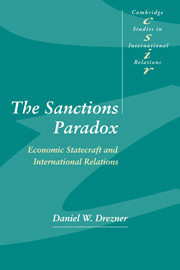Book contents
- Frontmatter
- Contents
- List of figures
- List of tables
- Acknowledgments
- 1 Introduction
- Part I Theory and data
- Part II Economic coercion in the former Soviet Union
- Part III Choosing between carrots and sticks
- Part IV Conclusion
- 9 Conclusions, implications, speculations
- References
- Index
- Cambridge Studies in International Relations
9 - Conclusions, implications, speculations
Published online by Cambridge University Press: 15 January 2010
- Frontmatter
- Contents
- List of figures
- List of tables
- Acknowledgments
- 1 Introduction
- Part I Theory and data
- Part II Economic coercion in the former Soviet Union
- Part III Choosing between carrots and sticks
- Part IV Conclusion
- 9 Conclusions, implications, speculations
- References
- Index
- Cambridge Studies in International Relations
Summary
Theories can never be proven true, but they can amass support. This support is more robust if the evidence varies across time and place. The evidence has ranged in place from the corridors of power in Washington to the oil fields of the Caspian Sea to the demilitarized zone on the Korean peninsula. It has moved in time from the Peloponnesian war to the present day.
This chapter summarizes what has been learned about economic coercion in international relations. It first reviews the predictions and performance of the conflict expectations model, and summarizes additional insights gained from the empirical record. It then offers up a critique of the theories and methodologies developed in the previous chapters. These conclusions have ramifications for the study and practice of foreign policy. This chapter concludes by discussing the model's policy implications, and then considering the broader implications for international relations theory and future research.
A review
When states decide whether to threaten economic coercion, or how to respond to such a threat, they care about the immediate costs and benefits of sanctions implementation, but they also care about the likelihood of future political conflicts. Concessions made in the present can be translated into future leverage, or can blemish a reputation for tough bargaining. When states anticipate frequent conflicts in the future, they will care more about the relative gains implications of the immediate outcome.
- Type
- Chapter
- Information
- The Sanctions ParadoxEconomic Statecraft and International Relations, pp. 307 - 321Publisher: Cambridge University PressPrint publication year: 1999



